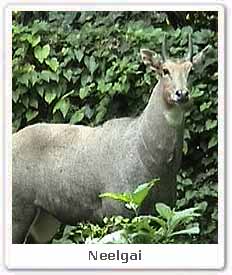| Kingdom : | Animalia |
| Phylum : | Chordata |
| Class: | Mammalia |
| Order : | Artiodactyla |
| Family : | Bovidae |
| Subfamily : | Bovinae |
| Genus : | Boselaphus |
| Species: | B. tragocamelus |
| Zoological name : | Boselaphus tragocamelus |
| Found In : | SariskaTiger Reserve, Ranthambore National Park and Sultanpur Bird Sanctuary |
 Physical
appearance : Neelgai is 6- 7 feet long and weigh around 120 -240 kg.
They are 4- 5 feet tall. They have erectile mane on the nape and back and
the hair pennant in the middle of the underside of the neck. They have white
spot on their cheeks, lips and throat Along the underside is a thin white
stripe, which "balloons" at the rear. They have long and slender
head. Males have 8 -10 inch long horns. It has relatively small horns. Their
tail is 40- 45 cm long.Male coat is gray blue and female coat is yellow
brown in colour.
Physical
appearance : Neelgai is 6- 7 feet long and weigh around 120 -240 kg.
They are 4- 5 feet tall. They have erectile mane on the nape and back and
the hair pennant in the middle of the underside of the neck. They have white
spot on their cheeks, lips and throat Along the underside is a thin white
stripe, which "balloons" at the rear. They have long and slender
head. Males have 8 -10 inch long horns. It has relatively small horns. Their
tail is 40- 45 cm long.Male coat is gray blue and female coat is yellow
brown in colour. Presence in India : Neelgai are widely found in the jungles of Karnataka, Rajasthan, West Bengal, Assam and Haryana. They are also commonly seen in some of the National parks and wildlife Sanctuaries such as Sariska, Ranthambore, Panna and Sultanpur.
Habitat : Neelgai prefers to live in open plains, woodlands, dense jungles and grasslands.
Diet : Neelgai feeds on plants, seeds, branches, leaves, fruit, flowers, stems and buds.
Reproduction : Neelgai reach the level of sexual maturity in 18 months. They do not have any specific breeding season. The gestation period rests for 275 days. Usually twins are born at a time. Young ones weigh around 30 -35 pounds.
Conservation status : Declared by the IUCN as being at low risk of extinction.
Lifespan : Neelgai lives up to 20- 30 years of age.






